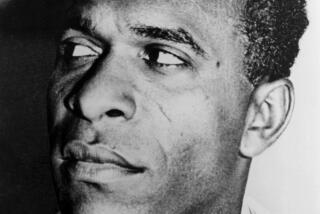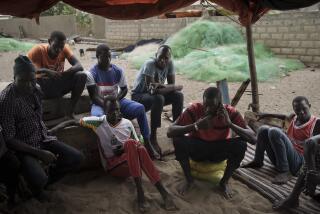A Continent of Trampled Hope That Does Not Die
- Share via
I went to Africa as a correspondent in the mid-1990s and vowed to write of more than its travails. I said I would not succumb to despair.
Not easy promises to keep.
As this front page from Times archives demonstrates, the truth of 20th century Africa too often reflects the stereotypes.
A continent so long and brutally violated behaves, no surprise, like a person abused. So Africa rages and inflicts pain--chiefly on itself.
But Africa smiles too. It hopes. Its children go to school believing in a better tomorrow.
One of the great tide-changes of the century occurred here: Africans got their continent back, beginning with the independence of Ghana on March 6, 1957, and concluding when a handsome man walked out of a South African prison on Feb. 11, 1990, to undertake the miracle of bridging hatreds.
Is there anyone to match Nelson Mandela?
Perhaps we need our own Mandela to show us that Africans have things to teach, as well as to learn.
I never met an African who was lonely in the way that so many Americans are lonely. Husbands and wives may be separated for months by cruel demands of employment, but a vast web of family connections and social obligations binds them tight.
People young and old, those who so clearly lack purpose in Western industrialized society, are not cast loose in Africa’s. Baby boomers here will come to see the wisdom of Africa’s approach in the coming half-century when it’s their turn to be dropped off at a nursing home.
Yet misery in Africa has not ended with national independence and majority rule. In ways that are life-and-death and bread-and-butter, Africa is worse off now.
Independence is a word that suggests freedom from the control of others. By that definition, tens of millions of Africans have yet to enjoy it. The French and Belgians and Portuguese and British have been replaced. But a few overlords in fancy clothes still subjugate the many in their rags. The Africans I know take some, but not a lot, of relief in cowering before tyrants of their own instead of commissars from abroad.
Independence has not united the peoples of Nigeria and Sierra Leone, the Congo and Rwanda, Angola and Somalia, to name some. America’s lone de facto colony, Liberia, settled in the 19th century by freed slaves with financing from U.S. “colonization societies,” is as bad a shambles as anyplace on earth.
Independence, whether seized or granted, implies the righting of wrong. Africa has not been so lucky yet.
Explanations are many. Slavery goes back a millennium before America’s cotton. This perpetual culling and demeaning of people, what could that do to the spirit? Imperialism divided the continent by boundaries that reflect neither natural geography nor ethnicity. Colonialism favored some African peoples over others, inflaming and institutionalizing ethnic rivalries as a matter of policy. The Cold War armed and sustained the cruelest of despots.
Shown oppression, Africans oppress.
*
It is incorrect to say Americans do not care. Thousands of them do: diplomats and doctors and aid workers and clergy and journalists. Most of them give from the heart, because service in Africa is generally apart from the normal paths of advancement.
But it is also true that Africa seldom rises to that level of engagement that we define as our “national interest.” That is, the continent is neither territorially a threat nor economically an opportunity. Africa receives only glancing concern. We see it out of the corner of our eyes in the corner of the newspaper. And too often, we find ourselves disheartened.
When that happens to me, I go to my stereo. I select a CD from Zaire and put the volume high.
From pain and poverty, Zairians, now Congolese, have created a spellbinding, deep-throated music that is like nothing else.
In it, some people find echoes of rock ‘n’ roll, folk ballad, reggae, yodeling, Chicago blues, ululation, jungle drum and church choir.
In this music, I find reason to believe: The memories of sultry, unspeakably hot nightclubs in Africa with low ceilings and unfinished floors, crowds so dense that we fused together as one moving, living thing. The odors were sharp, the lighting crazy, and the energy feverish.
Here, I rubbed and mingled and danced and drank on their turf with young Africans out for love and fun and companionship.
Between sets, we would talk. I would tell them my country had been a colony too. We would toast independence. We would toast the future.
They had not lost hope. Far from it.
Who am I to call them wrong?
More to Read
Sign up for Essential California
The most important California stories and recommendations in your inbox every morning.
You may occasionally receive promotional content from the Los Angeles Times.













